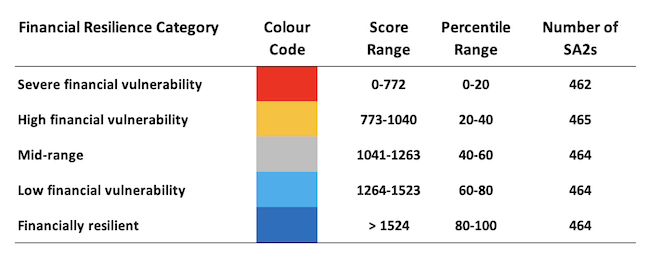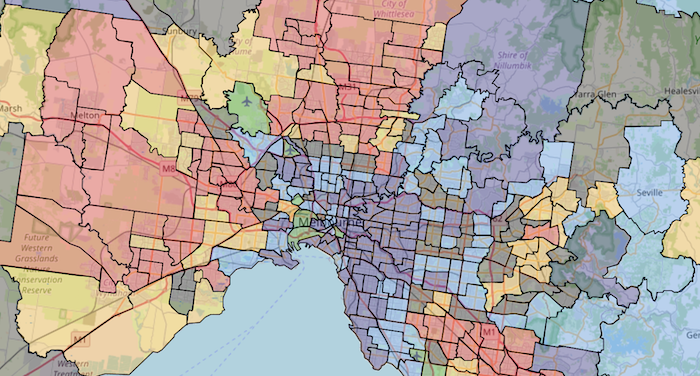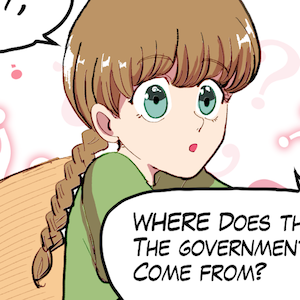These notes will serve as part of a briefing document that I will send off…
Launching the CofFEE Financial Resilience Barometer – Version 1.0
It’s Wednesday and while there is a lot to write about, I am prioritising the release today of our latest research at the Centre of Full Employment and Equity (CofFEE). The release of what we are calling the – CofFEE Financial Resilience Barometer – Version 1.0 – is part of a research collaboration I have with Professor Scott Baum at Griffith University. We have Australian Research Council funding for the next three years to explore regional resilience in the face of economic shocks, particularly after the massive disruptions from the Covid pandemic. Today we release the first output of that research. I also consider other matters today and the usual Wednesday music segment comes with a song from a leading Palestinian singer.
CofFEE Financial Resilience Barometer – Version 1.0
Today, we are releasing the results of the first stage of a three-year project that is being funded by the Australian Research Council on regional resilience in the face of economic shocks – particularly following the massive disruptions caused by the Pandemic.
The Centre of Full Employment and Equity, University of Newcastle and the Cities Research Institute, Griffith University have worked to develop the Financial Resilience Barometer (FRB) for small regions across Australia.
The FRB is a collaboration between myself (at CofFEE) and Professor Scott Baum (Griffith University) who is a regular guest blogger here and who I have been working and publishing with for many years.
This part of the Project sought, initially, to construct what we are calling the ‘Financial Resilience Barometer’, which is an index that purports to measure financial vulnerability.
Financial vulnerability arises from a lack of financial and economic resources.
The former Reserve Bank governor kept justifying the interest rate hikes by claiming that households had savings that would insulate them from the damage.
The problem is that for many Australian households they have little or no buffers and have been hit with rising cost-of-living pressures and then the interest rate hikes.
They are in the group we term ‘seriously financially vulnerable’ and risk losing everything.
Measuring financial resilience at the community level also feeds into the long-standing and established research into the spatial distribution of socio-economic disadvantages and inequality.
Understanding the associations between geography or space and well-being, social exclusion, inequality or poverty has been a part of the social science research landscape for many decades.
In this stage of the Project, we deployed a multidimensional statistical framework, which considers financial resilience across four axes:
- Economic resources (savings, ability to meet costs, income, ability to raise money in an emergency).
- Financial resources (access to and insurance banking services).
- Financial knowledge and behaviour (knowledge of financial services, proactive financial actions, confidence in using financial products).
- Social capital (social connections, access to social supports, access to community and government support).
The FRB divides the regions (which are close to suburbs) into five categories depending on its FRB Index score:
The novel nature of this work is to integrate data from the Australian Bureau of Statistics (ABS) Census, the Australian Tax Office, and other survey data to calculate an index score for over 2,000 localities in both metropolitan and rural/regional areas.
Across capital cities a patchwork of financial resilience and vulnerability is evident, with the outcomes in cities showing higher concentrations of both extremes.
The mapping of results shows distinct clusters of inner-city financial resilience and outer-suburb clusters of financial vulnerability.
The FRB recognises that financial vulnerability is not just concentrated in disadvantaged communities but has become a feature of other places as well.
The existence of extreme financial vulnerability in places not traditionally thought as highly disadvantaged illustrates just how widespread the issue is.
This is the first output from the Project.
We are now engaged in spatial econometric analysis of the data to determine likely causal relations, which will help us develop suitable policy interventions.
The Home Page – CofFEE Financial Resilience Barometer – Version 1.0 – provides access to the detailed geographic profiles and a mapping tool that produces chloropeth maps for each state and territory in Australia.
The maps provide a good overview of the geographic dispersion of financial vulnerability across the Australian landscape.
Here is a snapshot of what the Melbourne Metropolitan region looks like:
The detailed profiles allow one to drill down to the ‘suburb’ level to examine the reasons for a particular index value and percentile ranking.
The technical report that details the development and interpretation of the index we have derived is – The Australian Financial Resilience Barometer: An Index for Australian Localities – is available.
It includes an explanation of the methodology used to calculate the Financial Resilience Barometer, commentary and the major policy recommendations.
As an application, we have now looked at the relationship between our FRB Index and the voting patterns in Australia’s referendum last weekend, which rejected the inclusion of a First Nations voice in the Australian Constitution.
Preliminary logistic regression analysis of the YES/NO vote at the same spatial level as the FRB Index indicates:
1, Political allegiance did not really drive the vote except for Green voters who were highly likely to vote YES. Voting patterns for the two main parties in federal elections was not a good predictor of how one would vote in the Referendum.
2. The FRB Index variable is strongly predictive – more resilience, more likely a YES vote.
A tentative conjecture is that households who are financially resilient have more capacity to indulge in higher order concerns, such as the rights of the poor or First Nations people.
Wheras, those who are in the seriously vulnerable regions are more likely to be preoccupied with financial survival than being receptive to the higher order concerns.
3. The low education variable is strongly predictive and negative – so the more educated, the higher YES probability.
The NO campaign was marked by a massive torrent of misinformation and lies about what the consequences of a YES vote would be.
People were told, for example, that if the vote was carried, then the UN would take over Australia.
Polls suggested many voters didn’t really understand what they were voting on.
The polls also exposed a massive deficiency in the level of understanding of basic civics – how our governmental institutions worked.
All of those things are influenced by how educated one is.
In fact, the Referendum proposal was simple and very moderate.
To think it was more than that reflects a basic lack of knowledge.
Anyway, we are working on these matters and the Project is funded for three years.
So undoubtedly I will tell you more about the outcomes as they emerge.
Stage 1 down though.
US Treasury Secretary – US has no financial constraints in supporting international terrorism
The US Treasury Secretary gave an interview on the right-wing Sky News this week and told the audience that the US could (Source):
America can certainly afford to stand with Israel and to support Israel’s military needs and we also can and must support Ukraine in its struggle against Russia.
Condemning and arming a force that is opposing an illegal occupation, while simultaneously not condemning yet arming a nation that is engaged in illegal occupation and human rights abuses.
That’s the US for you.
But no-one is asking where is the money coming from?
But if there was a program proposed to help the poor or provide jobs for all, then the screams about the government going broke would go to 11!
Bombing hospitals
The Australian government has moved a motion that sought to condemn the attacks on Israel by what it called the terrorist organisation Hamas.
It has never moved a motion condemning the illegal occupation by Israel, the burning of Palestinian homes, the killing of Palestinian citizens by the IDF, including the murder of journalist Shireen Abu Akleh.
They are always silent on those issues.
But now the leaders of our government are out there posturing about the shocking behaviour of Hamas and our Defence Minister has claimed the attack on Israel is totally ‘unprovoked’.
I wonder what meaning he attributes to provoked?
In the House of Representatives, the Greens have tried to amend the motion to include reference to “war crimes perpetrated by the State of Israel” and to delete the sentence that our nation “stands with Israel and recognises its inherent right to defend itself”.
The motion was lost in favour of the government 107 to 7 votes and the original motion was passed.
The same process went ahead in the upper house, the Senate where the Greens tried to amend the government’s motion with words condemning:
… war crimes perpetrated by the state of Israel, including the bombing of Palestinian civilians and calls for an immediate ceasefire between all parties and an end to the war on Gaza …
… that for there to be peace, there must be an end to the state of Israel’s illegal occupation of the Palestinian territories
The Australian government was also quick to condemn the illegal Russian occupation of areas of the Ukraine in 2014.
But when it comes to Israel who deliberately and illegally occupy Palestinian territories and inflict shocking hardships on the citizens who live there including their children, our governemnt and main opposition parties are mute.
Dumb.
I wonder how they feel this morning as we learn of the criminal bombing of the hospital in Gaza – the murder hundreds of women, children and sick people by IDF.
I know there is uncertainty about the source of the bombing with the IDF denying it and claiming it was Hamas who did it.
Remember, before they were forced by the evidence to eventually admit to murdering Shireen Abu Akleh the Israeli state and the IDF also denied that act.
There is growing evidence this morning that the ordinance that destroyed the hospital last night could not have come from Hamas, who do not have the capacity to launch such a weapon.
Is the Australian government going to introduce a new motion today calling for the trial for war crimes of the Israeli leadership and cancelling all aid to that nation?
Not a chance.
Which is an indictment on the ethics and morality of our political leadership and all those who support them.
It is a morality that I do not share.
Israel is a terrorist state by any definition and the continual support of it by Western governments implicates them in the same terrorist ventures.
Coming Friday – October 20, 2023
Our new – MMTed – project is coming to fruition and will be released to the public on Friday.
Look out for it!
All the details will be announced here this Friday.
Music – Nai Barghouti – We will return
I thought this was appropriate today.
Nai Barghouti is a classically-trained Palestinian singer and flautist from Ramallah and is known throughout the world for her vocal style, which combines the traditional – Arabic maqam – melodic modes with Western jazz styles.
This song – Raj’een (We will return) was recorded in 2021.
The term ‘mother’ in the song refers to Palestine.
Of relevance, she was banned from doing some concerts in Egypt in August because that nation was schmoozing up to Israel and the Americans and didn’t like her pro Palestinian message.
That is enough for today!
(c) Copyright 2023 William Mitchell. All Rights Reserved.



I wonder if the money for the ongoing wars comes from debt issuing or from the printers.
I have little doubt that the negative influence of forty years of neo-liberalism on Australian society has had some influence on the Voice to Parliament referendum result. I also feel very sad, ashamed and sorry about the lost opportunity for our indigenous Australians to make some gains towards the place they should occupy in our society.
Also very sadly, the suffering of Palestinians in the Occupied Territories is enabled only by the massive military and logistic support of the United States.
Israel is a vital component of US geopolitical strategy in the region, which is essentially to maintain its ability to profit from Middle East oil.
Genuine US interest in Israel only began when the 6 Day War in 1967 destroyed the secular nationalist government in Egypt, delivering opportunities for the US to maintain compliant repressive regimes in the region that are so convenient for its business interests.
Much of the regional tension that has resulted from this and other US actions could be alleviated by the establishment of a nuclear free zone in the Middle East, The US rejects this idea out of hand, refusing to acknowledge Israel’s nuclear capability which would make its military support of Israel illegal under US law.
So we have the embarrassing situation where Australian support for Israel is essentially unreserved suport for ongoing US hegemony (and contravention of both US and International law) as well as endorsement of the illegal and cruel repression of Palestinians.
Australia’s support for Israel’s security should be conditional on its withdrawal from the Occupied Territories and implementation of full citizenship and equal rights for Palestinians living in Israel.
Our continual endorsement of the worst of US foreign policy contributes nothing toward its improvement and makes us look weak to the rest of the world.
@ Dave Willson Re: ‘Genuine US interest in Israel only began when the 6 Day War in 1967 destroyed the secular nationalist government in Egypt, delivering opportunities for the US to maintain compliant repressive regimes in the region that are so convenient for its business interests.’ The US, in terms of both government aid and ‘charity’ donations was giving considerable support to Israel before 1967, although the relationship was not cosy enough for the US to be told or actively involved in helping with Israel’s nuclear armament. That was France. And the 1967 War did not destroy the secular nationalist government in Egypt (which continued under Nasser and then from 1970 under Sadat), although it reduced its influence in Egypt and with other Arab countries. Sadat’s regime was only less secular than Nassar’s in that he didn’t keep the Muslim Brotherhood imprisoned. Egypt has still been pretty ‘compliant’, signing the Israel-Egypt Peace Treaty in 1979 and leaving the Palestinians under Israeli open imprisonment in the West Bank and Gaza. As far as compliant regimes go, a much bigger loss was the ousting of the Shah of Iran in 1979. As in the UK, in the US, Israel has influence through its economically and politically influential supporters rather than a role in delivering middle east oil.
Re: US military support, this seems to flow even when illegal under US or International law.
Hi Bill
Great work on Financial Resilience.
I don’t know whether you know about similar work by the UK Office for National Statistics as part of the 2021 Census, but here’s the link anyway:
https://www.ons.gov.uk/datasets/TS003/editions/2021/versions/2#summary
At the bottom of the page under “Related Content” there are a couple of links, including one to a map colour-coding areas in England and Wales according to levels of Household Deprivation. It might be interesting to make some comparisons even if differing criteria preclude rigorous analysis.